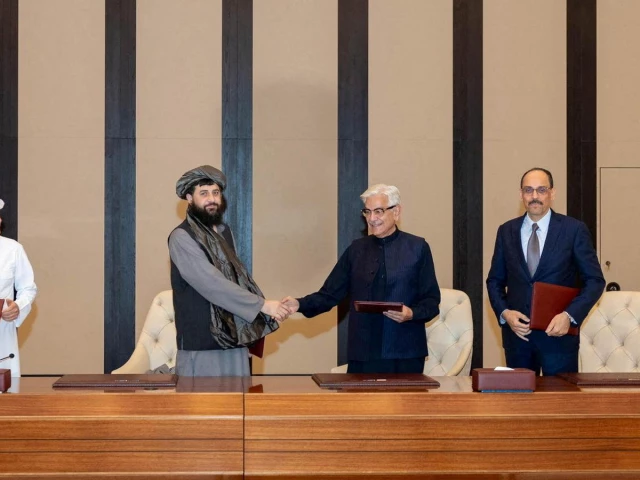The Ministry of Information clarifies that Islamabad proposed to extradite persons operating from Afghanistan to Pakistan
Defense Minister Khawaja Muhammad Asif and Afghan Defense Minister Mullah Mohammad Yaqoob Mujahid shake hands after signing a ceasefire agreement brokered by Qatar and Turkey in Doha on October 19. Photo: Reuters
Pakistan rejected claims allegedly made by the Afghan government that suggested Islamabad had rejected Kabul’s proposal to repatriate Pakistani nationals.
In a post on X, the Ministry of Information and Broadcasting said Pakistan ‘rejects the deliberate distortion of facts’ attributed to the Afghan spokesperson regarding the recent Istanbul talks.
The ministry clarified that during the talks, Pakistan had demanded action against terrorists operating from Afghanistan and posing a threat to Pakistan. “When the Afghan side claimed that these persons were Pakistani nationals, Pakistan immediately suggested that they should be extradited through designated border posts, in line with Pakistan’s longstanding position,” the statement read.
“Any claim to the contrary is false and misleading,” the ministry added.
Pakistan denies deliberate distortion of facts attributed to Afghan spokesman regarding Istanbul talks.
Pakistan had demanded that terrorists in Afghanistan who pose a threat to Pakistan be checked or arrested.
When the Afghan side said they were Pakistani nationals, pic.twitter.com/m8fvr29HXK— Ministry of Information and Broadcasting (@MoIB_Official) 1 November 2025
Pakistan denies deliberate distortion of facts attributed to Afghan spokesman regarding Istanbul talks.
Pakistan had demanded that terrorists in Afghanistan who pose a threat to Pakistan be checked or arrested.
The contradiction came after a Kabul-based news outlet on X aired a statement attributed to Afghan government spokesman Zabihullah Mujahid claiming that “the Islamic Emirate offered to deport migrants, but Pakistan rejected the proposal”.
The war of words came against the backdrop of ceasefire talks in Doha, where Pakistan and the Afghan Taliban had reached a tentative agreement on Thursday after six days of high-level talks in Istanbul.
Read: Pakistan, Afghan Taliban reach temporary understanding in Istanbul talks
The development was aimed at preventing the use of Afghan soil for terrorist activities against Pakistan and taking decisive action against India-backed militant groups, Tehreek-e-Taliban Pakistan (TTP) and Balochistan Liberation Army (BLA), referred to by Pakistani officials as ‘Fitna al-Khawarij’ and ‘Fitna al-Hindustan’.
The dialogue appeared to have stalled several times over the past week, with the Pakistani delegation even preparing to return home without a breakthrough. Following requests from the host nations – Turkiye and Qatar – and an appeal from the Afghan Taliban delegation, Pakistan agreed to continue the talks “to give peace another chance”.
During Thursday’s session, both sides reached a preliminary mutual understanding, with key points outlined as follows:
1. All parties reaffirmed that the purpose of the negotiations was to strengthen the ceasefire originally agreed in Doha.
2. Both sides committed to maintain the ceasefire on the condition that Afghan territory will not be used for terrorist attacks against Pakistan. The understanding also calls for the Afghan Taliban to take ‘clear, verifiable and effective action’ against groups such as Fitna al Khwarij (TTP) and Fitna al Hindustan (BLA).
3. The next round of negotiations will be held in Istanbul on November 6 to finalize details and implementation mechanisms.
4. A joint monitoring and verification mechanism will be established to ensure compliance and impose sanctions on any party that violates the agreement.
5. Turkiye and Qatar, acting as mediators and hosts, commended both sides for their participation and reaffirmed their commitment to support lasting peace and stability in the region.
Also read: Ceasefire with Kabul comes with caveats
During the negotiations, the Pakistani delegation maintained a firm and evidence-based position and presented its demands with “clarity, professionalism and logical consistency”. The final agreement was described as a ‘victory for reason and national interest’.
The preliminary outcome of the negotiations is a positive step towards regional stability and a milestone achievement despite the opponents’ attempts to derail the process through propaganda and pressure.
Pakistan’s participation in the Istanbul talks, characterized by ‘seriousness, prudence and national dignity’, has been widely appreciated. Mediation efforts in Turkiye and Qatar were also credited with helping achieve the breakthrough.
The government reiterated that Pakistan remains committed to the pursuit of peace but will not compromise its sovereignty, national interests or public security. Civilian and military leaders reaffirmed unity and determination to counter all internal and external threats to the country’s stability.



